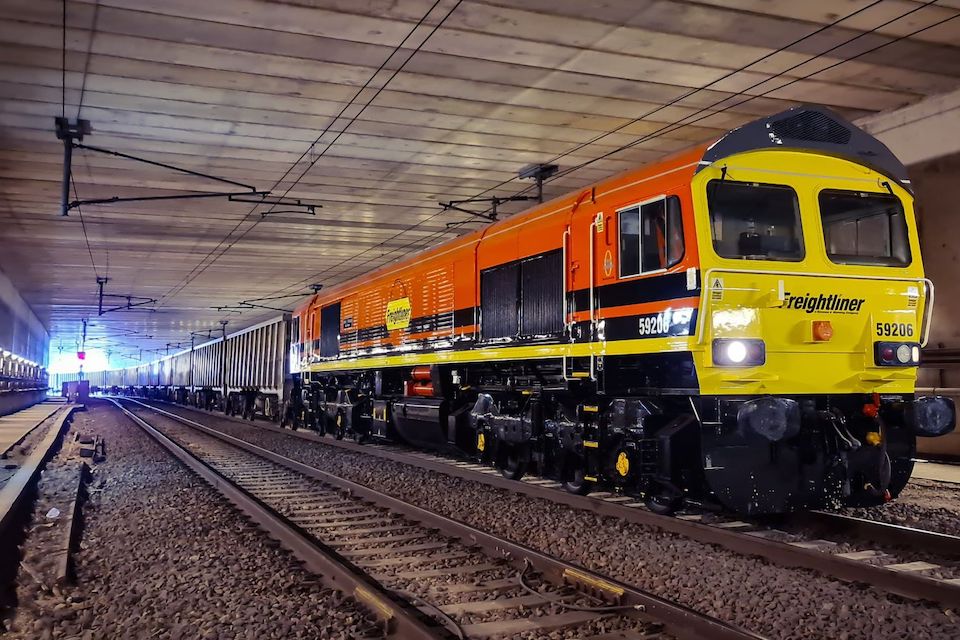Freightliner moves aggregates records in the UK

Freightliner UK has moved record tonnages in March, citing the growth in aggregates as the prime reason. The month of March 2021 proved to be a key milestone for American-owned Freightliner UK, and their partner Mendip Rail. Freightliner hauled the single largest volume of aggregates in Mendip Rail’s history at 796,000 tonnes, running an average 120 trains per week and surpassing the previous record of 761,000 tonnes, also set by Freightliner in March 2020.
Other operators in the UK are seeing similar high demand for bulk movement as the construction industry continues to grow, and urban projects are increasingly turning to rail freight to satisfy demand for raw materials. High-profile projects like HS2, London’s Crossrail, and the recently proposed nuclear power station at Sizewell on the Suffolk coast, are all generating demand not seen since the height of the now-defunct coal industry.
Success in the face of challenges
Year on year growth in the aggregates sector is proving a boon for rail freight operations across the UK. The economic development pattern of the UK, and unique geology of the British Isles, means that building materials tend to be located in regions far removed from the centres of development. Building booms in the South East around London, and the North West around Manchester, require supplies from remote parts of the South West of England and from Central England quarries.

A case in point is the Mendip Rail consortium, a joint venture between two of the UK’s largest aggregate and cement producers Hanson Aggregates and Aggregate Industries. Since the commencement of Freightliner’s contract with Mendip Rail in November 2019, tonnage has continued to grow, prompting rolling stock orders and increased volumes. This success comes in the face of challenges such as COVID-19, and the economic uncertainty around Brexit. Nevertheless, the contraction industry has proved resilient, and demand has contend unabated. Clients have actually turned to rail freight during the economic upheaval, as they see rail in terms of reliability despite everything.
Leading role in low-carbon logistics
Freightliner say they have continued to haul significant volumes of aggregate from quarries in the Mendips, Northern Somerset to terminals in London and the Southeast of England for use in various construction projects including HS2, housing and road improvements. The Freightliner-Mendip partnership recently trialled the longest and heaviest train on the UK network – the so-called ‘jumbo train’ at 4,000 tonnes. The consist was hauled with a single locomotive, using an entirely sustainable fuel source, which reflected well on the company’s recently achieved the internationally recognised ISO14001 Environmental Management Systems standard for their Vehicle Maintenance Facility in

.“Rail freight already plays a leading role in the low-carbon logistics sector, with each freight train producing 76 per cent fewer carbon emissions per tonne moved compared to road,” said recently appointed Chief Executive Officer for G&W UK/Europe Region companies Eddie Aston. “Moving increased volumes by rail will go a long way towards meeting government decarbonisation targets, and the added ISO14001 accreditation means that we will continually challenge ourselves to ensure we maintain the ISO Environmental Management Systems standards, reducing our impact on the environment even further.”
Records are not set by themselves
In a good week for the aggregates sector – with Cemex announcing further investment in their rail-served capabilities at Selby in Yorkshire, Jason Black, Director Mendip Rail Limited added his thoughts. “The achievement of another monthly record is a reflection on the strong demand in the construction sector and the increasing importance rail freight plays in supplying a broad range of construction projects. Records are not set by themselves and Mendip Rail would like to thank Freightliner and our other supply chain partners in making it happen.
Stringent emissions targets, set by the UK government, have made operators think hard about servicing developments, particularly in urban environments. Finding alternatives to traditional diesel fuel, while using existing motive power, has been a challenge. However, workable solutions have been found, including alternative fuels that can be used in existing power plants. “At Mendip Rail, we were delighted to have been asked to take part in the 100 per cent sustainable fuel trial”, noted Black. “Not only did the trial record significant carbon reductions but also particulate emission reductions, which is a particularly important air quality measure in urban areas.”
You just read one of our premium articles free of charge
Want full access? Take advantage of our exclusive offer




